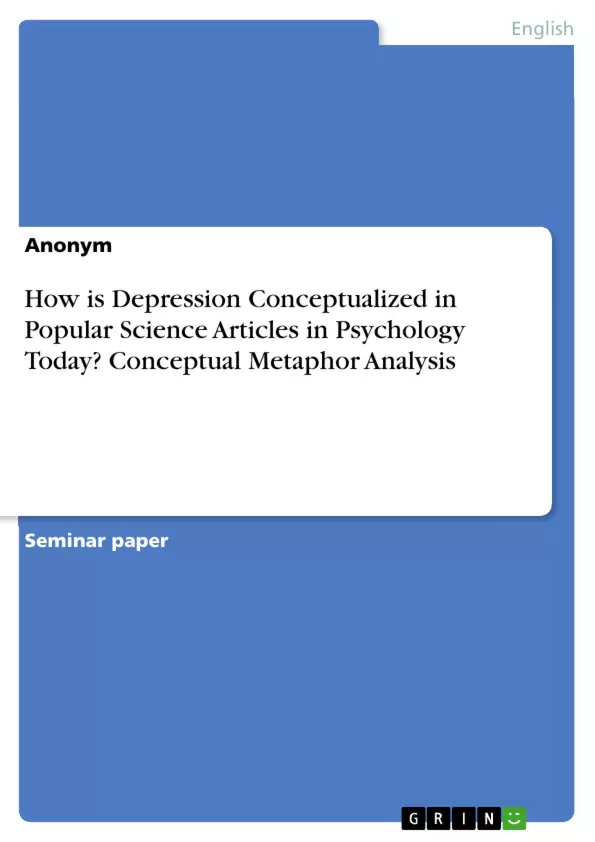This project work is going to examine and analyze how depression is conceptualized in magazine articles. My analysis is based on the Conceptual Metaphor Theory established by Lakoff and Johnson. First, it will give a theoretical overview concerning Lakoff & Johnson’s theory. Secondly, both the language material (corpus) and the method used to analyze it will be presented. The analysis of the language material will be presented in chapter four, followed by a summary which will conclude the findings. As stated by "Anxiety and Depression Association of America" (ADAA), 264 million people worldwide live with the mood disorder depression. According to the Oxford Learners Dictionary, depression is “a medical condition in which a person feels very sad and anxious and often has physical symptoms such as being unable to sleep".
On the other hand, according to the American Psychological Association (APA), "depression is more than just sadness. People with depression may experience a lack of interest and pleasure in daily activities, significant weight loss or gain, insomnia or excessive sleeping, lack of energy, inability to concentrate, feelings of worthlessness or excessive guilt and recurrent thoughts of death or suicide." Metaphorical expressions are frequently used in everyday communication to refer to abstract concepts, for instance feelings or mental states. Metaphors are one of the linguistic tools that are used to frame mental health problems, verbalize and describe disease conditions.
Hence, psychological disorders can be metaphorically described as places in space where someone has fallen into or as adversaries that need to be fought against. Based on the principles of the Conceptual Metaphor Theory developed by Lakoff & Johnson, McMullen & Conway and Charteris-Black, have studied metaphors of depression. McCullen & Conway draw upon data which is collected from a study of client depression-related metaphors through psychotherapy sessions to show the pervasiveness of specific conceptual metaphors. Charteris-Black looked at metaphors of depression in interviews of people who had experienced it.
Table of Contents
- Introduction
- Theoretical basis
- Basic terminology
- Metaphorical ICM's
- Novel metaphor
- Corpus and method
- Corpus
- Method
- Analysis
- DEALING WITH DEPRESSION IS WAR
- DEPRESSION IS DESCENT
- DEPRESSION IS BEING TRAPPED
- DEPRESSION IS DARKNESS
- DEPRESSION IS A CONTAINER
- DEPRESSION IS A MOBILE ENTITY
- Metaphorical scenario: Living with depression is boating
- Summary
Objectives and Key Themes
This project examines how depression is conceptualized in magazine articles, drawing on the principles of Conceptual Metaphor Theory. It aims to provide a comprehensive analysis of the metaphorical language used to describe this mental health condition, exploring the underlying conceptual metaphors that shape our understanding of depression.
- The application of Conceptual Metaphor Theory to understanding depression
- Analysis of metaphorical expressions used to describe depression
- Identification of prevalent conceptual metaphors related to depression
- The impact of metaphorical language on framing and understanding mental health issues
- The role of metaphor in communication and conceptualization of abstract concepts
Chapter Summaries
- Introduction: This chapter provides a brief overview of depression and its prevalence, highlighting the importance of understanding how it is conceptualized in language. The chapter also introduces the concept of metaphorical expressions and their use in framing mental health issues.
- Theoretical basis: This chapter explores the theoretical foundations of Conceptual Metaphor Theory as developed by Lakoff & Johnson, outlining key concepts such as conceptual metaphors, source and target domains, and the systematic nature of metaphorical mappings.
- Corpus and method: This chapter describes the language material (corpus) used in the analysis and the methods employed to analyze it.
- Analysis: This chapter presents the in-depth analysis of the language material, focusing on the identification and interpretation of key conceptual metaphors related to depression. This includes examining metaphors such as "DEALING WITH DEPRESSION IS WAR," "DEPRESSION IS DESCENT," "DEPRESSION IS DARKNESS," and "DEPRESSION IS A CONTAINER."
Keywords
This work focuses on analyzing metaphorical expressions in popular science articles related to depression, utilizing Conceptual Metaphor Theory to explore the conceptualization of depression in language. Key terms and concepts include: conceptual metaphor, source domain, target domain, metaphorical mappings, depression, mental health, language, communication, framing, and conceptualization.
Frequently Asked Questions
What is Conceptual Metaphor Theory (CMT)?
CMT, established by Lakoff and Johnson, suggests that we understand abstract concepts (like emotions) through more concrete "source domains" (like war or descent).
How is depression metaphorically described in popular science?
Common metaphors include "DEPRESSION IS WAR," "DEPRESSION IS DARKNESS," and "DEPRESSION IS A CONTAINER" or being trapped.
Why do we use metaphors to talk about mental health?
Metaphors are linguistic tools used to frame complex mental states, making them easier to verbalize, describe, and understand for both patients and the public.
What does the metaphor "DEPRESSION IS DESCENT" imply?
It conceptualizes the condition as a physical fall or a movement downwards, often associated with a lack of control and a deep, dark place.
What source material was used for this analysis?
The analysis is based on a corpus of magazine articles from "Psychology Today," examining how they frame depression for a general audience.
- Quote paper
- Anonym (Author), 2022, How is Depression Conceptualized in Popular Science Articles in Psychology Today? Conceptual Metaphor Analysis, Munich, GRIN Verlag, https://www.grin.com/document/1182743



